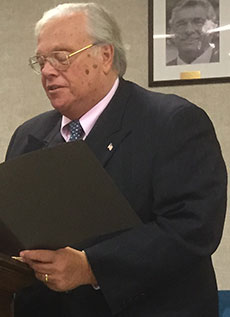
City Councilor Joseph J. Bevilacqua. (WHAV News file photograph.)
Haverhill residents do not have to worry about a chemical, known as PFAS, in their drinking water.
That was the assessment of the city’s Deputy Public Works Director Robert E. Ward at a City Council meeting this week. The chemicals, known formally as polyfluoroalkyl substances, are found in food packaging, household cleaners, electronics and other products. Ward told councilors, although it is a concern because these chemicals can last for thousands of years, so far, Haverhill has seen no issues.
“We’re a surface water supply. We have, you know, reservoirs as opposed to many communities that have ground water. The PFAS problems are occurring in ground water sources much more so than surface water supplies,” he explained.
Councilor Joseph J. Bevilacqua placed the matter on the agenda, saying the chemicals may be leaching into drinking water supplies. He said they are a matter of concern around the country and believed to contribute to liver, kidney and thyroid cancers.
Ward noted that even though the Environmental Protection Agency has yet to issue any definitive guidelines regarding PFAS, Massachusetts has already begun testing drinking water supplies.
“We have been, on the drinking water side. We are already being required to start testing the drinking water for PFAS. We have the latest technology for sampling. We have not measured or detected any PFAS in the City of Haverhill’s drinking water,” he said.
Ward said the city recently upgraded its water treatment plant and uses a technology called granular activated carbon. He said the technology would remove those chemicals if they did appear.
He did say, however, PFAS have impacted the city on the wastewater side because those chemicals have been detected in some municipalities’ wastewater and sludge. This, in turn, has limited the areas where sludge can be deposited causing a significant increase in disposal costs. Ward said disposal fees have increased by 40%.
He also said the only way he can see to eliminate the problem would be for manufacturers to stop using those chemicals in their products.
